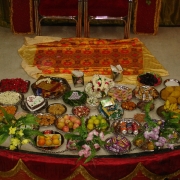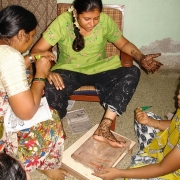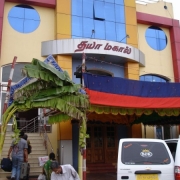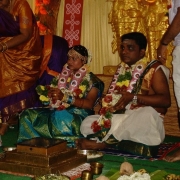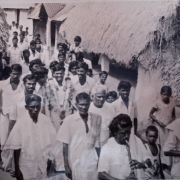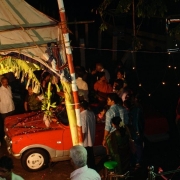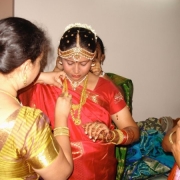The photos and videos on this page can be used in conjunction with the case study entitled: Arranging a Marriage in Middle Class South India. The photos display everything from contemporary marriage venues to a comparison of old and new versions of a wedding tradition. The videos depict both the beginning and culmination of a middle-class arranged marriage in south India. Refer to captions for more details.
The author of this study, Nicole A. Wilson, has spent a total of two and a half years in Madurai, Tamilnadu, observing firsthand the social and cultural changes that occurred between 2006 and 2011. She also maintains regular contact with the people featured in this case study. Uma Sankaran and Sundandaradevi, now both widows and no longer possessing cumankali status, often lament the loss of their husbands, but continue to participate in many Hindu women’s rituals. Radhika and her husband, Senthil, now have a two-year-old son and live away from their parents in Kanchipuram, Tamilnadu.
Radhika and her family arrive at her first betrothal ceremony in Coimbatore, Tamilnadu (hometown of the groom). Prior to this, Radhika and Senthil have only met each other via Skype. Hence, this betrothal ceremony is the first time Radhika and Senthil will meet face to face. Video taken by: Nicole A. Wilson
Radhika and Senthil performing viḷaiyāṭṭu (lit. play), a form of ritualized flirting, on the final day of the wedding festivities. This clip shows Senthil beautifying Radhika with flowers and hair combing and her responding that he did not meet her expectations. Senthil then tries to pour rice and break appaḷam (thin, crisp food similar to a large potato chip) over Radhika’s head while she and her female relatives help her to avoid him. The viḷaiyāṭṭu also includes singing competitions and coconut keep-away. Video taken by: Nicole A. Wilson




